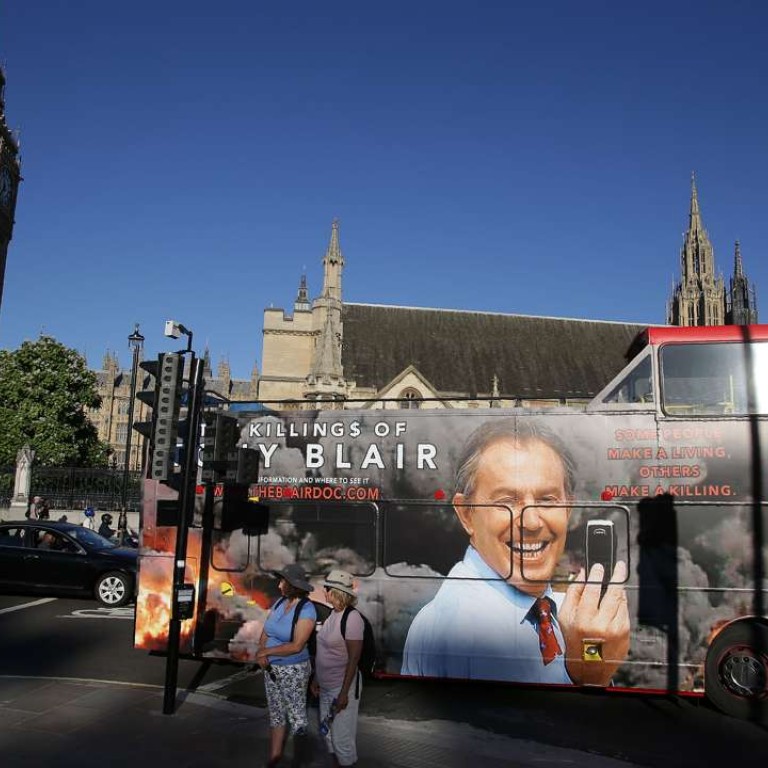
Brexit may represent the final rejection of Tony Blair’s legacy of globalisation
Kenny Hodgart says even before the publication of the damning Chilcot report, many people had made up their minds that the former UK prime minister was a villain, but one thing is clear – he was an internationalist all the way
It’s telling that when they were lining up to scold Britain in 2013, both Russia and China took aim at its self-image. “A small island that no one pays attention to” was the verdict of Vladimir Putin’s spokesman, Dmitry Peskov. “Just an old European country apt for travel and study,” chimed the Chinese Communist Party-owned Global Times.
Fear of insignificance has rather haunted vital regions of the British psyche, perhaps for as long as the country has been without imperial possessions. Certainly, as detailed in Lord Chilcot’s voluminous and long-awaited report on his inquiry into Britain’s role in the Iraq war, published earlier this month, it haunted Tony Blair.
Chilcot’s report is about five times the length of War and Peace
The former prime minister’s determination to go to war, Chilcot tells us, was underpinned by a sense of anxiety about Britain’s role on the world stage. In particular, he wanted to show that its “special relationship” with the United States mattered; that however much George W. Bush might have been prepared to walk a unilateralist line in 2003, deep down, America really needed Britain on board.
Chilcot’s report is about five times the length of War and Peace. Unpacking it has therefore served as a distraction from the fallout of Britain’s vote to leave the European Union – a decision that has caused its own surfeit of angst. It has also meant assessments of the freshly-exeunted David Cameron’s prime ministerial legacy have jockeyed with renewed interest in the record of a man (Blair) who left office nine years ago.

‘Unbowed arrogance’: British press respond with venom to former prime minister Tony Blair’s apology for Iraq war
The trouble with all of this is that Blair’s enemies – and they are legion, on both the left and right of British politics – hardly needed to read what Chilcot had to say about him, because they had already made their minds up as to the extent of his villainy. However nuanced the report, enough of it can be marshalled to succour the notion that the war was fought illegally – and for some that’s all that matters, as though proving the point might make the big bad world more ordered, more rational.
Britain’s forces were ill-equipped and ill-prepared for war in Iraq. Their attempts to hold Basra ended in humiliation. Unfortunately, knowing these things gives us no better idea of how to deal with failing or failed autocratic and authoritarian states in the Middle East.
As far as Blair is concerned, his part in the downfall of Iraq’s Saddam Hussein was at odds with how he approached other despots in the region. In his attempts to seek engagement with Bashar al-Assad in Syria, Muammar Gaddafi in Libya and Hosni Mubarak in Egypt, he understood the trade-off between stability and tolerating intractable regimes. That none of them grew any less intractable led, by and by, to the Arab spring, and to the civil wars that have followed.

David Cameron came to power as ‘heir to Blair’ and both men will be defined by one historic error
By 2011, however, there was little appetite in the West for new military entanglements. Western powers willed democracy in the region but withheld any meaningful support to see it delivered. In Syria, moderate rebels looked for help where they could get it, only to find themselves engulfed by a millennialist death cult. The result is a murderous stalemate that has caused about 11 million people to flee their homes. The shock waves from Syria’s collapse are felt in all parts of the Middle East and Europe.
Blair’s reputation remains benighted, whatever the success of moves now to impeach or prosecute him
There are those for whom all of this goes back to the invasion of Iraq, for whom Islamic State’s neo-medieval brutality is a phenomenon born entirely of Western fallacy and folly. Neither provable nor completely falsifiable, theirs is a view of the world that will retain its appeal sufficiently enough to ensure, if nothing else, that Tony Blair’s reputation remains benighted, whatever the success of moves now to impeach or prosecute him.
The rueful irony is that for all his foreign policy failures, Blair was an internationalist to the core. His government – reforming, progressive, pluralistic – embraced globalisation and declared Britain more open to the world than ever before. When he stood down, he left it a little less grey and a little more gay than he had found it. Arguably, it’s his vision voters finally rejected with Brexit. Whether it can survive remains to be seen.
Kenny Hodgart is a former staff journalist at the Post who has lived in Hong Kong since 2011

